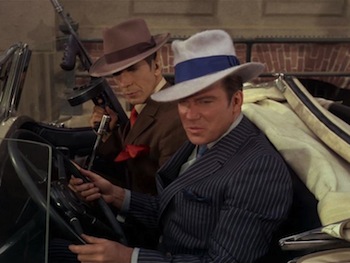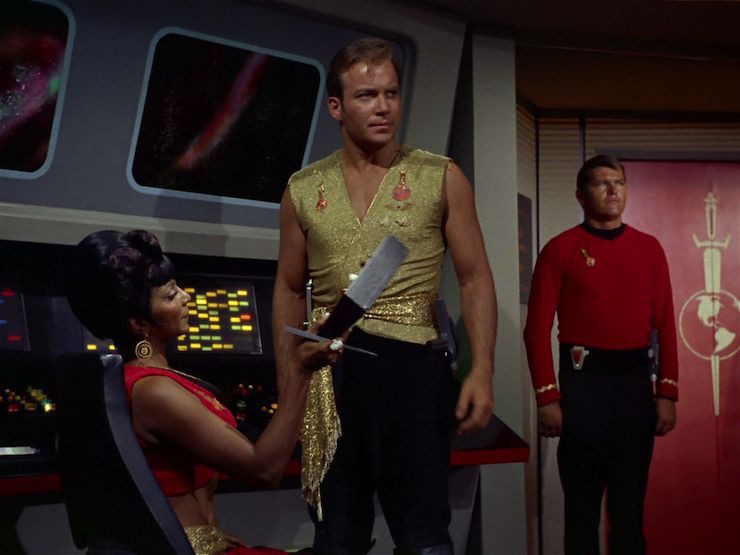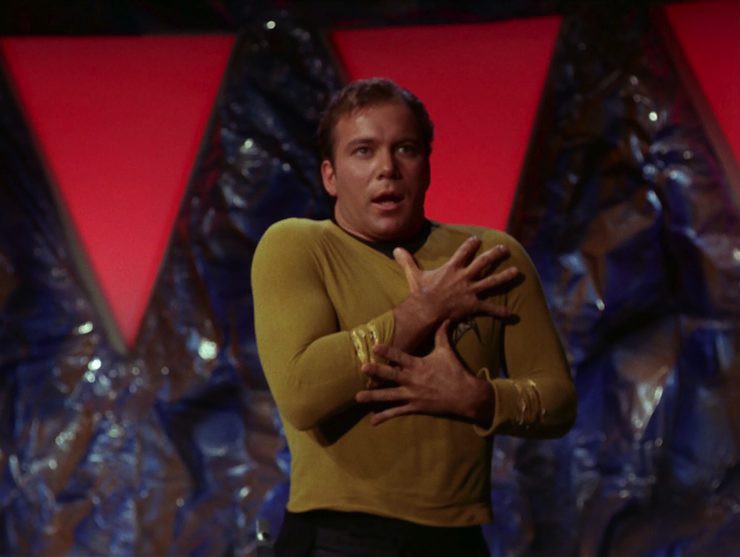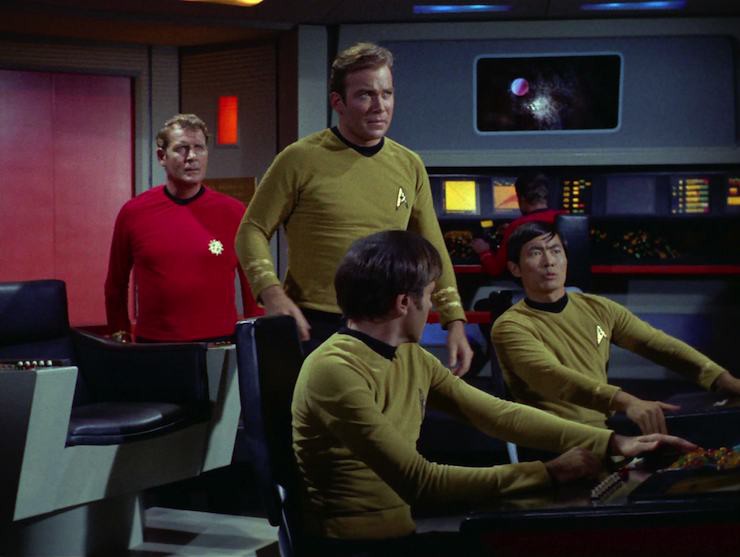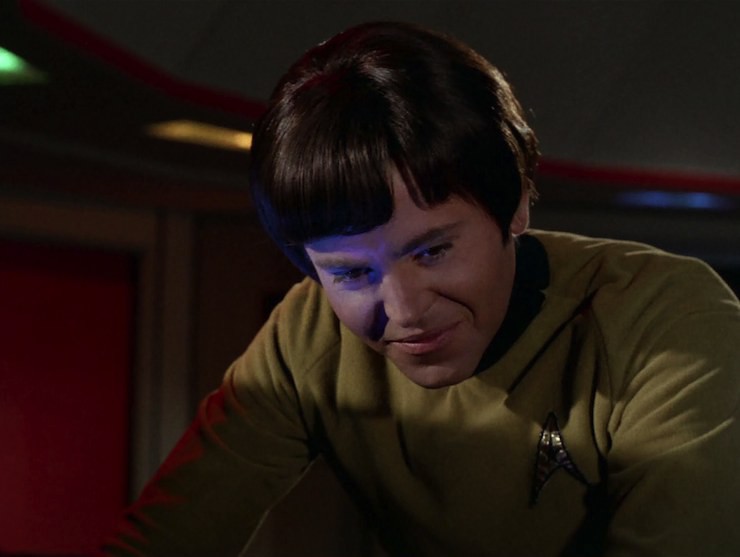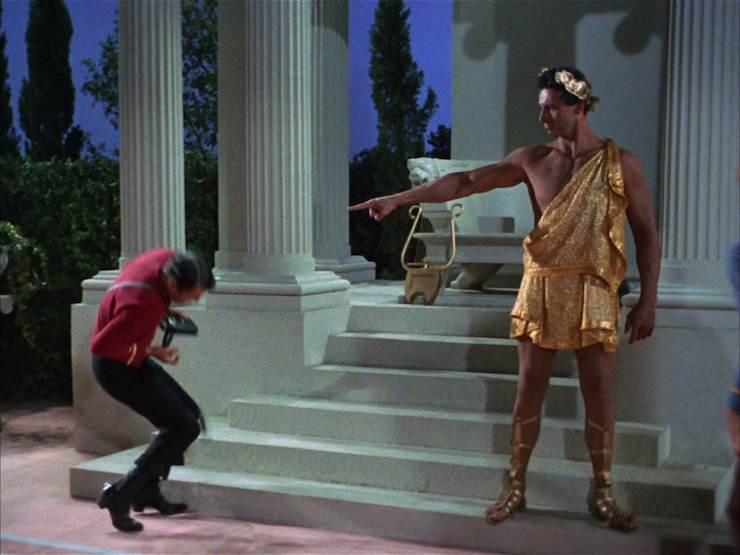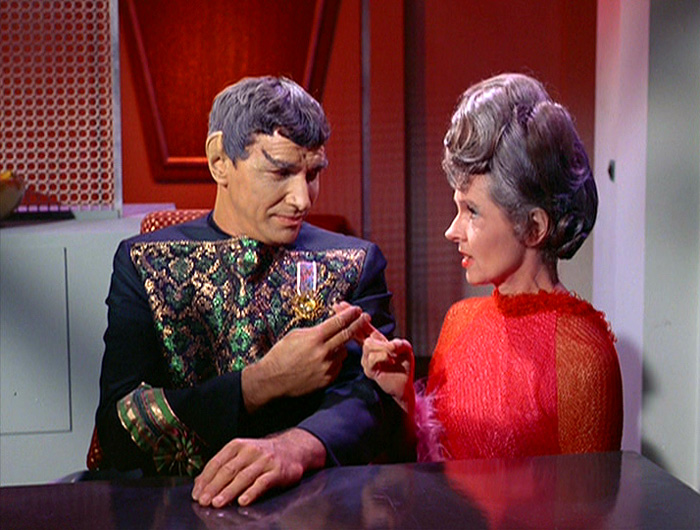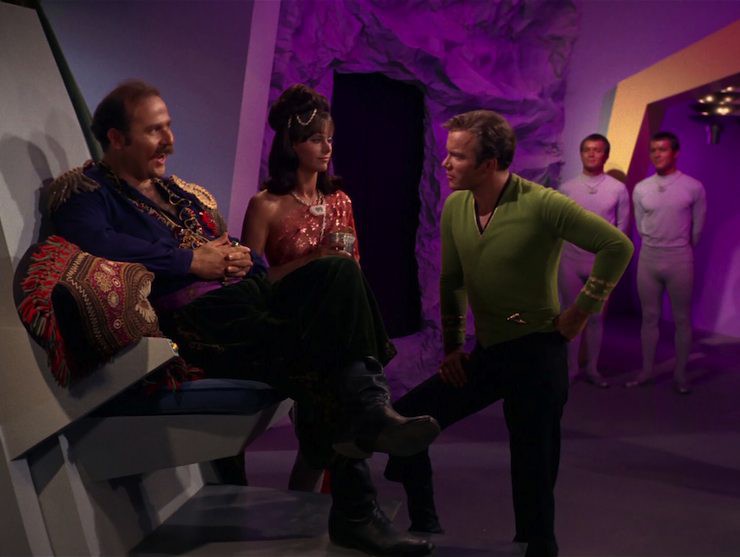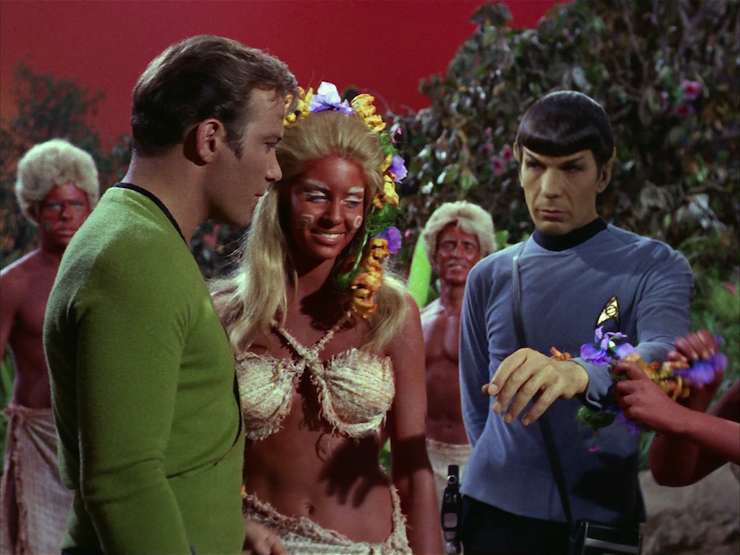Star Trek Second Season
Original air dates: September 1967 – March 1968
Executive Producer: Gene Roddenberry
Producer (to “Journey to Babel”): Gene L. Coon
Producer (from “Bread and Circuses”): John Meredyth Lucas
Captain’s log. Where the first season had the show finding its way and figuring out what worked and what didn’t—one moment an ensemble, the next a showcase for the guest star of the week (a common mode of dramas of the time), the next a three-lead show—by season two, it had pretty much settled into a three-lead show.
We still got hints of the ensemble (moments in “Obsession” and “The Trouble with Tribbles” in particular), and occasionally the guest star became the focus of the episode (again “Obsession,” as well as “Metamorphosis,” “The Ultimate Computer,” and naturally “Assignment: Earth“), but mostly they were pretty well settled in the formula of Kirk, Spock, and McCoy beam down to a planet and have adventures. In fact, that formula was so well-liked by the end of the previous season that DeForest Kelley was elevated to the opening credits to reflect his equal role as part of the triad atop the series, and proving his mettle particularly in “Friday’s Child,” “Amok Time,” “Bread and Circuses,” “Journey to Babel,” “A Private Little War,” “The Immunity Syndrome,” “The Ultimate Computer,” and especially “Return to Tomorrow.”
The notion of the Klingons as recurring antagonists takes root in this season as well, as that enemy empire appears in three episodes. (The Romulans also make a return appearance in “The Deadly Years,” but no Romulans are actually seen, and their role is secondary.)
Perhaps of greatest import, however, is the recognition of Spock as the breakout character. The episode that sent Spock back to his home planet, “Amok Time,” was deliberately aired as the season premiere to take advantage of the character’s popularity, and besides his abortive wedding in that episode, we also meet his parents in “Journey to Babel,” and Leonard Nimoy gets several opportunities to break character, not only with Spock’s pon farr in “Amok Time,” but also with his evil, goatée’d counterpart in “Mirror, Mirror,” his humorous role-playing in “I, Mudd” and “A Piece of the Action,” and being possessed by Henoch in “Return to Tomorrow.”
Highest-rated episode: A tie between two of the most iconic episodes of the entire franchise, “Mirror, Mirror” and “The Trouble with Tribbles,” the season’s only two 10s. Honorable mention to the two 9s, “Amok Time” and “The Doomsday Machine.”
Lowest-rated episode: “The Omega Glory” with a much-deserved 0.
Most comments (as of this writing): “Obsession,” the only episode to reach three figures in comments with 108. Not entirely sure why, but there it is.
Fewest comments (as of this writing): “Return to Tomorrow” with only 22. Risk may be our business, but I guess commenting about it isn’t…
Favorite Can’t we just reverse the polarity? From “The Immunity Syndrome“: The space amoeba is eleven thousand miles long, width varying from two to three thousand miles, its outer layer is studded with space debris and waste, while the interior consists of protoplasm. That’s a big Twinkie….
Favorite Fascinating. From “Metamorphosis“: When Spock shows off his disruptor he says, “It cannot fail.” He then activates it and it totally fails.
Favorite I’m a doctor not an escalator. From “Return to Tomorrow“: McCoy is against the plan from jump because of the physical consequences to the crew’s bodies as well as the other attendant risks, and his refusal to go along with Thalassa’s rather awful plan is a crowning moment of awesome matched only by his standing up to Khan.
Favorite Ahead warp one, aye. From “The Deadly Years“: Sulu was good enough to be left in command in combat against the Gorn and against the Klingons in “Arena” and “Errand of Mercy,” respectively, in the latter case during a declared state of war, so it’s unclear why Stocker can’t just put him in charge after Kirk’s declared incompetent. It’s even less clear as the battle against the Romulans rages on and Stocker keeps asking Sulu for advice.
Favorite Hailing frequencies open. From “The Deadly Years“: Uhura gets the best line of the episode when Stocker asks her to let him know if they contact any Romulan ships. The ship is hit with weapons fire a second later, and Uhura dryly says, “I think we just made contact, sir.”
Favorite I cannot change the laws of physics! From “By Any Other Name“: Scotty gets Tomar drunk. At one point, he pulls out a drink and is too swozzled to remember what it is, so he drunkenly identifies the libation to Tomar: “It’s green.” This scene will be echoed when James Doohan guest stars as Scotty on TNG‘s “Relics” when Data serves an unlabeled bottle to Scotty and can only say that, “It is green.”
Favorite It’s a Russian invention. From “Friday’s Child“: As with McCoy, so too with Chekov: we get the source of the navigator’s category as he claims that “fool me once, shame on you; fool me twice, shame on me” is actually a saying from Russia. His silly smile after he says it indicates that he knows he’s full of shit, a level of self-awareness of his own foolishness he will abandon before too long….
Favorite Go put on a red shirt. From “The Omega Glory“: Poor Galloway gets attacked by the Yangs and then Tracey shoots him like he’s an injured horse being put out of his misery. Kirk barely even notices that he’s been shot. (Hell, Kirk mispronounces his last name as “Galway”—perhaps mixing him up with another doomed crewmember whose death had no obvious effect on him—at the top of the episode.)
Favorite No sex, please, we’re Starfleet: From “Who Mourns for Adonais?” Palamas gets the best line of the episode, when she rejects Apollo, asking, “Is that the secret of your power over women? The thunderbolts you throw?” Wah-HEY!
Favorite Channel open. From “Friday’s Child“: “How did you arrange to touch her, Bones? Give her a happy pill?”
“No, a right cross.”
Kirk advocating drugging a pregnant woman, while McCoy expresses his preference for violence against pregnant women.
Favorite Welcome aboard. Some very memorable guest stars in this season: Julie Newmar, elevating the Capellan people out of stereotype territory by the power of her own awesomeness as Eleen in “Friday’s Child.” Michael Forest, nailing the role of Apollo despite having to wear a doofy toga in “Who Mourns for Adonais?” Celia Lovsky, bringing huge swaths of gravitas to the role of T’Pau, and Arlene Martel, bringing a quiet steel to the role of T’Pring, in “Amok Time.” William Windom totally inhabiting Decker and his PTSD in “The Doomsday Machine.” Roger C. Carmel is magnificently hilarious in his return engagement as the title character in “I, Mudd.” Reggie Nadler brings a supreme dignity to the role of Shras in “Journey to Babel.” Joseph Ruskin continues to have the best voice ever in his first of many Trek roles as Galt in “The Gamesters of Triskelion.” Anthony Caruso and Vic Tayback are delightfully gruff as gangsters Oxmyx and Krako in “A Piece of the Action.” William Marshall brings his overwhelming presence to the role of Daystrom in “The Ultimate Computer.” And Robert Lansing and Teri Garr make you long for the spinoff that never was in “Assignment: Earth.”
All by itself, “The Trouble with Tribbles” is a cornucopia of great guest casting, as we get William Schallert, William Campbell, Whit Bissell, Charlie Brill, Michael Pataki, Guy Raymond, and the great Stanley Adams.
But the big guests of the season are Mark Lenard and Jane Wyatt, providing the iconic roles of Spock’s parents, Sarek and Amanda, in “Journey to Babel.”
Favorite Trivial matters: A tough choice—there’s the one for “Mirror, Mirror,” there’s the one for “Journey to Babel,” there’s the one for “Amok Time,” and there’s the one for “Assignment: Earth,” all episodes that had long reaches beyond their hours…
To boldly go. “Live long and prosper.” It’s funny, I always thought of the second season as the pinnacle of the original series, but that was mostly due to the sheer power of the season’s four finest episodes, “Mirror, Mirror,” “The Trouble with Tribbles,” “The Doomsday Machine,” and “Amok Time,” not to mention important episodes like “Metamorphosis” and “The Deadly Years” and “Journey to Babel” and “Assignment: Earth.” So many elements of the franchise that would continue to recur throughout the movies and the spinoff series and the tie-in fiction were established in those eight episodes.
The series embraced all-out comedy to a greater degree than it did in the first season, which gave us not only one of the two episodes generally regarded as the show’s finest (“Tribbles“), but also the delightful romps of “I, Mudd” and “A Piece of the Action.”
But actually watching the episodes again week after week, I’m appalled with how incredibly weak the season is. For starters, there’s all the truly horrible episodes, starting with “Catspaw” at the top of the season and going all the way to the low point of Trek to date in “The Omega Glory.” There’s silly stuff like the Roman episode and the Nazi episode. Worse, we have episodes like “The Apple” and especially “The Gamesters of Triskelion.” Whenever people make fun of Star Trek or want to demean it in some way, it’s as likely as not that they’re referring to something that came from one of these two awful episodes, from the former’s systematic murder of every redshirt (while the rest of the cast emerges wholly unscathed, including characters who suffer the same kind of attack) to the latter’s seduction of a buxom green-haired woman in a skimpy silver outfit.
Worse, though, is that there is almost none of the humanism, the compassion, of the first season. The theme throughout season one was that there are no monsters, only people of different types. But the second season is almost all monsters, from the extragalactic creeps in “Catspaw” to the titular “Doomsday Machine” to Redjac in “Wolf in the Fold” to Nomad in “The Changeling” to Vaal in “The Apple” to the giant amoeba in “The Immunity Syndrome” to the cloud creature in “Obsession.” The exceptions—the giant floating omelette in “Metamorphosis,” the Kelvans in “By Any Other Name“—are few and far between. The Enterprise spends way too much time defeating enemies and not enough time seeking out new life and new civilizations.
Still, one can’t deny the importance of the season’s high points, and it makes slogging through the (many more) low points worth the trouble.
Warp factor rating for the season: 6
Next week: “Spectre of the Gun”
Keith R.A. DeCandido‘s X-Files short story “Back in El Paso My Life Will Be Worthless” in Trust No One was nominated for a Scribe Award for Best Short Story by the International Association of Media Tie-in Writers. (Also nominated in the Best Speculative Novel category were the Trek novels TNG: Armageddon’s Arrow by Dayton Ward and Seekers: Long Shot by David Mack.) The winners will be announced at Comic-Con International in San Diego in July.










